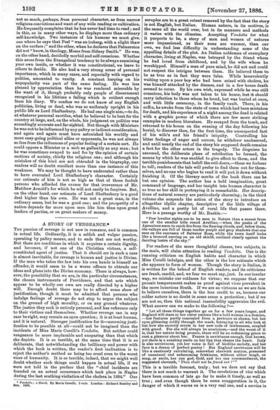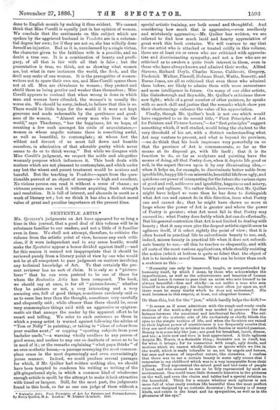A STORY OF VENGEANCE.* THE passion of revenge is not
new in romance, and is common in actual life. Ordinarily, it is a selfish and vulgar passion, operating by paltry means, and to ends that are not worthy. But there are conditions in which it acquires a certain dignity, and becomes, if not one of the Christian virtues, a self- constituted agent of justice. That it should err in such a case is almost inevitable, for revenge is human and justice is Divine. If the man who takes the law into his own hands is himself an offender, it would seem to be a worse offence to obtrude our ideas and plans into the Divine economy. There is always, how- ever, the possibility that we are, in the particular circumstances, the chosen instruments of Providence, and that acts which appear to be wholly our own are really directed by a higher will. Enough doubt there may be to afford some show of justification, though it must be admitted that persons who indulge feelings of revenge do not stop to argue the subject on the ground of high morality, or on any ground whatever. The justice they seek is entirely personal, and has reference only to their victims and themselves. Whether revenge can in any case be right, may remain an open question ; it is at least human, and it is natural. Stronger justification for it—assuming justi- fication to be possible at all—could not be imagined than the incidents of Miss Marie Corelli's Vendetta. But neither could vengeance be more implacable and unsparing than that which she depicts. It is so terrible, at the same time that it is so deliberate, that notwithstanding the brilliancy and power with which the book is written, the reader's first inclination is to reject the author's method as being too cruel even to the worst vices of humanity. It is so terrible, indeed, that we might well doubt whether such things could happen in actual life, if we were not told in the preface that the "chief incidents are founded on an actual occurrence which took place in Naples during the last scathing visitation of the cholera in 1884." Our
• Vendetta a Nord. By Marie Corelli. 3 vols. London : Richard Bentley and Bon. 1886. scruples are to a great extent removed by the fact that the story is not English, but Italian. Human nature, in its motives, is
the same all the world over, but in its manners and methods it varies with the climates. Accepting Vendetta for what it purports to be, a story of men and women of natures more impassioned, as their suns are warmer, than our own, we find less difficulty in understanding some of the appalling details of the plot. An Italian nobleman of exemplary character, living at Naples, was betrayed by the friend whom he had loved from childhood, and by the wife whom he worshipped. Himself a man of pare mind, he did not and could not suspect the intrigue between them. He believed them to be as true as in fact they were false. While benevolently waiting upon a poor boy who had been seized with cholera, he- was himself attacked by the disease, and in a few hours death seemed to occur. By his own wish, expressed while he was still conscious, his body was not taken to his house, lest it should carry infection to those whom he loved, but was buried at once, and with little ceremony, in the family vault. There, in his coffin, he awoke from the state of coma which had been mistaken for death, and his experience of a night among the dead is related with a graphic power of which there are few more striking examples in modern literature. He escaped from the tomb, and returned to his house on the evening of the day following his burial, to discover then, for the first time, the unsuspected fact of his wife's and his friend's iniquity. Controlling his bitter feelings of anger and sorrow, he withdrew unobserved, and until nearly the end of the story his supposed death remains a fact for the other actors in the tragedy. The disguises he assumed, the deliberate plans of retribution he formed, the means by which he was enabled to give effect to them, and the terrible punishments that befell the evil-doers,—these we forbear to tell ; readers of the tale will prefer to find them out for them- selves, and no one who begins to read it will put it down without finishing it. Of the literary merits of the book there can be but one opinion. The author has a bold imagination, great command of language, and her insight into human character is as true as her skill in portraying it is remarkable. Her descrip- tions of natural scenery are particularly charming ; in the third volume she suspends the action of the story to introduce an altogether idyllic chapter, descriptive of the little village of Avellino, and a pretty bit of rural life that passes there. Here is a passage worthy of Mr. Ruskin :—
" Few lovelier sights are to be seen in Nature than a sunset from one of the smaller hills round Avellino,—when the peaks of the Apennines seem to catch fire from the flaming clouds, and, below them, the valleys are full of those tender purple and grey shadows that one sees on the canvases of Salvator Rosa, while the town itself looks. like a bronzed carving on an old shield, outlined clearly against the dazzling lustre of the sky."
For readers of the more thoughtful classes, two subjects, in the main, will claim attention in reading Vendetta. One is the running criticism on English habits and character in which Miss Corelli indulges, and the other is the low estimate which she appears to form of women. Though the story is Italian, it is written for the behoof of English readers, and its criticisms are frank, candid, and, we fear we must say, just. In our insular way, we mistake our coldness for virtue ; we suppose that our prosaic temperament makes us proof against vices prevalent in the more luxurious South. If we are as virtuous as we are fain to believe ourselves, there is the less credit to us, because our colder nature is no doubt in some sense a protection ; but if we are not so, then this national insensibility aggravates the evil.
What answer can we make to the following ?—
"Let all these things together go on for a few years longer, and England will stare at her sister nations like a bold woman in a domino, —her features partly concealed from a pretence at shame, but her eyes glittering coldly through the mask, betraying to all who look at her how she secretly revels in her new code of lawlessness, coupled with greed. For she will always be avaricious,—and the worst of it is, that her nature being prosaic, there will be no redeeming grace W cast a glamour about her. France is unvirtnous enough, God knows, yet there is a sunshiny smile on her lips that cheers the heart. Italy is also unvirtuons, yet her voice is full of birdlike melody, and her face is a dream of perfect poetry ! Bat England unvirtuous will be like a cautiously calculating, somewhat shrewish matron, possessed of unnatural and unbecoming friskiness, without either laugh, or song, or smile, her one god, Gold, and her one commandment, the suggested eleventh, Thou shalt not be found out ' " This is a terrible forecast, truly ; but we dare not say that there is not much to warrant it. The revelations of vice which have been common of late go far to make it timely, as well as Ulna ; and even though there be some exaggeration in it, the danger of which it warns us is a very real one, and a service is. done to English morals by making it thus evident. We cannot think that Miss Corelli is equally just in her opinion of women. We conclude that the sentiments on this subject which are spoken by the aggrieved husband in Vendetta are in a substan- tial degree her own ; for if they are not so, she has wilfully done herself an injustice. Bad as it is, unredeemed by a single virtue, the character given to the faithless wife is a possible, and no doubt a true one. It is a combination of beauty and profli- gacy, of all that is fair with all that is false ; but the presentation is true, we think, not as showing what women are, but what in rare instances the world, the flesh, and the devil may make of one woman. It is the prerogative of women- writers not to spare their own sex, and Miss Oorelli spares them not at all. Men are chivalrous to women ; they protect and shield them as being gentler and weaker than themselves ; Miss Corelli appears to contend that when wrong is done in which man and woman have offended, the woman's is usually the worse sin. We should be sorry, indeed, to believe that this is so. There would be little hope for the world if it were not kept generous and made redeemable by the gentleness and good- ness of its women. "Almost every man who lives in the world," says Thackeray, "has the happiness, let us hope, of counting a few such amongst his circle of acquaintance,— women in whose angelic natures there is something awful, as well as beautiful, to contemplate ; at whose feet the wildest and fiercest of us must fall down and humble ourselves, in admiration of that adorable purity which never seems to do or to think wrong." But while we disagree with Miss Corelli's judgment, we respect the noble and altogether womanly purpose which influences it. This book deals with matters which are not pleasant to contemplate, and which under any but the wisest and purest treatment would be noxious and baneful. But the teaching in Vendetta—apart from the ques- tionable pursuit of an object of revenge—is high and excellent. No vicious person can read it without a sense of shame ; no virtuous person can read it without acquiring fresh strength and resolution. It is full of interest, and abounds in merit as a work of literary art ; but we think it has also a distinct moral value of great and peculiar importance at the present time.







































 Previous page
Previous page